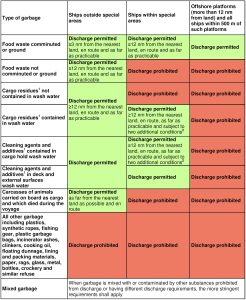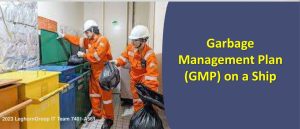Discover how MARPOL Annex V is transforming shipboard waste management. Learn how this key regulation is protecting marine ecosystems from garbage pollution, with real-world data, challenges, and future developments.
The International Convention for the Prevention of Pollution from Ships, MARPOL, is a key international marine environmental convention aimed at minimizing pollution of the oceans and seas from ships. This includes pollution from oil, chemicals, garbage, sewage, and air emissions. The MARPOL Convention has evolved through various amendments to address emerging environmental challenges and now consists of several annexes, each targeting different types of pollution.
Why MARPOL Annex V Matters in Modern Maritime Operations
Every minute, the equivalent of a garbage truck’s worth of plastic ends up in the ocean, according to the United Nations Environment Programme (UNEP). And while much attention focuses on land-based sources, ship-generated waste is a serious and often overlooked contributor. From plastic packaging to food scraps, the garbage produced by ships—if mismanaged—can wreak havoc on marine life and coastal communities.
To tackle this, the International Maritime Organization (IMO) adopted MARPOL Annex V, the fifth annex to the International Convention for the Prevention of Pollution from Ships (MARPOL). In force since 1988 and significantly amended in 2013, Annex V governs the prevention of pollution by garbage from ships—from fishing vessels to cruise liners.
This regulation is critical today more than ever. With over 50,000 merchant ships operating globally and increasing cruise and offshore traffic, how ships handle onboard waste is essential to keeping our oceans clean and our biodiversity alive.
What Is MARPOL Annex V and What Does It Cover?
MARPOL Annex V prohibits the discharge of nearly all garbage into the sea, except under very limited and controlled conditions. It applies to:
- All ships, regardless of size or type
- All types of garbage, from plastics to food waste, cooking oil, and cargo residues
To combat this issue, the IMO has established guidelines and regulations aimed at ensuring proper waste management practices onboard vessels. The MARPOL Annex V is particularly significant as it prohibits the discharge of all types of garbage into the sea unless specific conditions are met. The MARPOL Convention (International Convention for the Prevention of Pollution from Ships) provides a comprehensive framework for managing ship-generated waste.
Domestic Garbage (9 Groups):
- Plastics: All plastics, including synthetic ropes, bags, and packaging.
- Food Waste: Spoiled or unused food.
- Domestic Waste: Everyday waste like paper, cardboard, and rags.
- Cooking Oil: Used cooking oil and grease.
- Incinerator Ash: Residue from shipboard incinerators.
- E-Waste: Discarded electronic equipment.
- Glass: Bottles, jars, and other glass items.
- Metal: Cans, tins, and other metal waste.
- Ceramics: Dishes, tiles, and similar materials.
Cargo Residue Garbage (3 Groups):
- Cargo Residues (Non-Hazardous): Remnants of non-hazardous cargo.
- Cargo Residues (Hazardous): Remnants of hazardous cargo.
- Fishing Gear: Discarded fishing nets, lines, and traps.
Note: Discharge regulations vary by category and location (e.g., special areas have stricter rules). Proper garbage management and record-keeping in the Garbage Record Book are mandatory.
The most important principle? No garbage may be discharged unless the ship is far from land, en route, and only if the material is biodegradable and not harmful to the marine environment.
Under MARPOL Annex V, all discharges are subject to strict distance-from-shore rules, waste type restrictions, and equipment requirements.
–
Key Developments and Technical Requirements
Garbage Management Plans and Record Keeping
All ships of 100 gross tonnage and above, and those certified to carry 15 persons or more, must implement a Garbage Management Plan approved by their flag administration. The plan includes:
- Procedures for waste minimization and segregation
- Waste handling and storage instructions
- Crew responsibilities
In addition, ships must maintain a Garbage Record Book to log:
- The type and quantity of garbage
- Dates, times, and positions of discharge or disposal
- Disposal at port reception facilities
Port State Control inspections frequently target Garbage Record Book entries, and inconsistencies can lead to detention or fines.
Placards and Crew Awareness
All ships ≥12 meters in length must display placards informing crew and passengers about Annex V discharge rules, usually in multiple languages. These placards are often seen in galleys, mess rooms, and engine control areas.
Special Areas and Emission Control Zones
Annex V designates Special Areas where even stricter regulations apply due to the ecological sensitivity of those regions. These include:
- Mediterranean Sea
- Baltic Sea
- Black Sea
- Red Sea
- Persian Gulf area
- Antarctic waters
- Wider Caribbean Region including the Gulf of Mexico
In these zones, all garbage discharge is essentially prohibited except for ground food waste under specific conditions (e.g., ≥12 nautical miles from land).
Discharge Rules for Garbage under MARPOL Annex V:
presentation:
🚢 MARPOL Annex V — Garbage Categories (A to J) and Discharge Rules (2025)
| Code | Garbage Category | Typical Contents / Examples | Discharge Outside Special Areas | Discharge Inside Special Areas |
|---|---|---|---|---|
| A | Plastics |
All plastics — synthetic ropes, nets, plastic bags, packing films, polystyrene, synthetic fishing gear, etc.
|
❌ Prohibited everywhere — no discharge permitted. | ❌ Prohibited everywhere (including special areas). |
| B | Food Waste | Galley waste, meal scraps, peels, bones, coffee grounds, etc. | ✅ Allowed only if comminuted/ground ≤ 25 mm and ≥ 3 nm from land, en route. If not ground, must be ≥ 12 nm from land, en route.
|
⚠️ Only comminuted/ground food waste ≥ 12 nm from land, en route. Untreated food waste = ❌ Prohibited. In Antarctic Area: ❌ All food waste prohibited (except sterilized avian products – Reg. 6.1.3). |
| C | Domestic Waste | Paper, rags, glass, metal, bottles, crockery, paper packaging, cleaning materials. | ✅ Allowed if comminuted/ground ≤ 25 mm and ≥ 3 nm from land, en route; if not ground, ≥ 12 nm.
|
❌ Prohibited inside special areas. |
| D | Cooking Oil | Waste cooking/frying oils from galley operations. | ✅ Only to port reception facilities — ❌ not to sea.
|
❌ Prohibited. |
| E | Incinerator Ashes | Ashes from shipboard incineration (excluding plastic residues). | ✅ Permitted if not harmful to the marine environment and ≥ 12 nm, en route.
|
❌ Prohibited inside special areas. |
| F | Operational Wastes | Cleaning rags, sweepings, paint scrapings, maintenance waste, etc. | ✅ Allowed only if not harmful to the marine environment and ≥ 12 nm, en route.
|
❌ Prohibited inside special areas. |
| G | Cargo Residues | Leftovers, dust, scales after unloading solid bulk cargoes. | ✅ Permitted if residues are Non-HME (not harmful) and discharge is ≥ 12 nm, en route.
|
⚠️ Only under Reg. 6.1.2 conditions: both ports within same special area, no reception facility available, ship stays within area, discharge ≥ 12 nm, en route. Otherwise ❌. |
| H | Animal Carcasses | Carcasses of livestock carried on board. | ✅ Permitted as far from land as practicable (preferably > 100 nm), en route, ensuring they sink rapidly.
|
❌ Prohibited inside special areas. |
| I | Fishing Gear | Abandoned, lost, or discarded nets, lines, traps, etc. | ❌ Discharge prohibited except in accidental loss beyond crew control; must be reported to flag and coastal State.
|
❌ Same prohibition applies within special areas. |
| J | E-Waste (IMO addition – MEPC 79/2023) | Used electronic equipment, batteries, circuit boards, fluorescent tubes, etc. | ❌ Discharge prohibited — to be landed to reception facility.
|
❌ Prohibited. |
✅ Notes:
-
“nm” = nautical miles.
-
“HME” = Harmful to the Marine Environment (as defined in MARPOL Annex V Guidelines MEPC.307(73)).
-
“Special Areas” include the Mediterranean Sea, Baltic Sea, Black Sea, Red Sea, Gulf Areas, North Sea, Antarctic Area, and wider Caribbean region (Reg. 1.3 & Reg. 6 of Annex V).
Special Areas: Stricter rules apply; most discharges are prohibited.
Record Keeping: All discharges must be logged in the Garbage Record Book.
Best Practices for Eco-Conscious Ship Operations
Implementing best practices for garbage and waste management onboard ships is essential for promoting environmental sustainability. Here are some effective strategies:
- Waste Segregation: Proper segregation of waste at the source is critical in managing garbage effectively. Crew members should be trained to separate recyclable materials from general waste and hazardous materials.
- Color-Coded Bins: Utilizing color-coded bins for different types of waste (e.g., plastics, paper, food) can facilitate proper segregation.
- Minimizing Waste Generation: Reducing the amount of waste generated onboard is a proactive approach to managing garbage.
- Inventory Control: Implementing inventory control measures can help minimize excess packaging and food waste during voyages.
- Sustainable Sourcing: Choosing suppliers that use minimal packaging or sustainable materials can further reduce waste.
- Onboard Treatment Systems: Investing in onboard treatment systems can help process certain types of waste before disposal.
- Composting Systems: Composting organic waste reduces the volume of garbage while producing valuable compost that can be used in landscaping.
- Waste-to-Energy Systems: Technologies that convert waste into energy can significantly reduce landfill contributions while generating power for ship operations.
Real-World Practices and Enforcement Challenges
Cruise Ships and Waste Streams
A large cruise ship can produce 7 to 10 tons of garbage per day, including food waste, packaging, and even small amounts of hazardous waste. Companies like Royal Caribbean and Carnival now invest in waste shredders, compactors, food digesters, and advanced recycling systems to comply with Annex V.
Port Reception Facilities (PRFs)
One of the biggest bottlenecks for Annex V compliance is the availability of Port Reception Facilities. Ships are required to dispose of garbage at ports, but many ports—particularly in developing countries or island states—lack adequate waste collection and treatment systems. According to the IMO’s GISIS database, complaints from ships about inadequate PRFs remain common. The European Maritime Safety Agency (EMSA) has emphasized improving PRFs as a priority for sustainable maritime transport in its 2023 strategy.
Illegal Discharges and Detection
Despite clear regulations, illegal dumping still occurs. A 2022 report by Lloyd’s List Intelligence and Thetius estimates that up to 10% of vessels may be involved in unreported garbage discharges, especially in remote ocean areas. New enforcement tools include:
- Satellite surveillance
- Drone monitoring
- Port State Control inspections
- AIS-based behavioral analytics
Authorities like the US Coast Guard and Transport Canada also perform surprise inspections, and crews can face criminal prosecution for falsifying records.
–
Innovations and Emerging Best Practices
Smart Waste Segregation and Digital Logbooks
Technology is helping bridge the compliance gap. Many ships now use digital garbage record books that reduce human error and are harder to falsify. Automated waste segregation and smart bin systems allow better tracking of waste streams onboard.
Circular Economy at Sea
Some maritime operators are applying circular economy principles onboard:
- Using composting systems for food waste
- Implementing waste-to-energy incinerators
- Returning recyclables to onshore processing plants
Shipping companies like Maersk and Wallenius Wilhelmsen have committed to zero-waste strategies across parts of their fleets.
Training and Certification
Training programs like IMO Model Course 1.20 and offerings by institutions such as the Lloyd’s Maritime Academy help crew understand waste handling, segregation rules, and MARPOL documentation. Flag states and Classification Societies (like RINA, ClassNK, and ABS) are increasingly requiring waste management familiarization for Safety Management System (SMS) audits under the ISM Code.
–
Case Study: MARPOL Annex V in the Arctic
Arctic cruise traffic has increased significantly in the last decade. The Polar Code, which works alongside MARPOL Annexes I and V, introduces specific garbage management requirements for polar operations.
Vessels must:
- Store garbage for longer durations
- Prevent ice-contaminated garbage disposal
- Report to Polar authorities under the Polar Ship Certificate regime
In 2023, the Norwegian Maritime Authority reported that 97% of polar cruise ships operating under their flag were fully compliant with Polar Code and Annex V rules, supported by satellite monitoring and real-time voyage reporting.
–
Frequently Asked Questions (FAQ)
What is the main goal of MARPOL Annex V?
To prevent marine pollution by controlling and reducing the discharge of ship-generated garbage into the sea.
What type of garbage is completely banned from discharge under Annex V?
Plastics of any kind are strictly prohibited from discharge into the ocean under any conditions.
What is a Garbage Record Book, and who needs it?
It’s a mandatory log for ships ≥400 GT or certified to carry ≥15 persons, used to record details of all onboard garbage handling and discharges.
What is a Special Area under Annex V?
An ecologically sensitive region where stricter garbage discharge rules apply, such as the Mediterranean, Arctic, and Caribbean Seas.
What happens if a ship violates MARPOL Annex V?
Violations can lead to vessel detention, fines, or even criminal prosecution, depending on the jurisdiction.
Are fishing vessels covered under Annex V?
Yes. In fact, they must report lost or discarded fishing gear, which is a major source of marine debris.
How can ships ensure compliance with Annex V?
By implementing a Garbage Management Plan, training crew, using port reception facilities, and maintaining accurate records.
–
Conclusion
MARPOL Annex V is a powerful tool in the global fight against ocean garbage. It shifts the maritime industry toward greater responsibility, transparency, and sustainability. With illegal dumping still a threat and plastic pollution climbing, compliance isn’t just about avoiding fines—it’s about protecting the very oceans ships depend on. From cruise ship waste strategies to advanced port reception networks, every stakeholder has a role to play. The sea has no bins, and it’s up to us to ensure ships don’t treat it like one.
MULTIPLE CHOICE QUESTIONS – MARPOL ANNEX V (Garbage Pollution Prevention)
-
What is the primary objective of MARPOL Annex V?
A. Prevent air emissions from ships
B. Regulate sewage discharge at sea
C. Prevent marine pollution by ship-generated garbage
D. Limit ballast water discharge
Correct Answer: C. Prevent marine pollution by ship-generated garbage
-
Which type of garbage is strictly prohibited from being discharged into the sea at all times?
A. Food waste
B. Cooking oil
C. Plastics
D. Incinerator ash
Correct Answer: C. Plastics
-
What is the minimum distance from the nearest land required to discharge untreated food waste (outside Special Areas)?
A. 3 nautical miles
B. 6 nautical miles
C. 12 nautical miles
D. 15 nautical miles
Correct Answer: C. 12 nautical miles
-
Which of the following must all ships ≥100 GT or those carrying ≥15 persons have under Annex V?
A. Exhaust gas cleaning system
B. Oil Discharge Monitoring Equipment
C. Garbage Management Plan
D. Bunkering Logbook
Correct Answer: C. Garbage Management Plan
-
What must be used to record all garbage discharges, handling, and disposal operations?
A. Deck Logbook
B. Waste Certificate Register
C. Garbage Record Book
D. Ballast Water Log
Correct Answer: C. Garbage Record Book
-
Which of these regions is a Special Area under MARPOL Annex V?
A. Gulf of Alaska
B. Persian Gulf
C. Mediterranean Sea
D. South China Sea
Correct Answer: C. Mediterranean Sea
-
Discharge of cargo residues classified as hazardous under Annex V is:
A. Allowed ≥12 nm if diluted
B. Allowed if en route
C. Prohibited at all times
D. Allowed if passed through a comminuter
Correct Answer: C. Prohibited at all times
-
What is the purpose of placards required on ships ≥12 meters in length?
A. Display emergency evacuation routes
B. Warn about dangerous cargo
C. Inform crew about garbage discharge regulations
D. Show the ship’s IMO number
Correct Answer: C. Inform crew about garbage discharge regulations
-
What is one of the biggest challenges to Annex V compliance according to EMSA and IMO GISIS?
A. Lack of certified STPs
B. Inadequate Port Reception Facilities
C. Crew language barriers
D. Misuse of incinerators
Correct Answer: B. Inadequate Port Reception Facilities
-
What modern enforcement method is increasingly used to detect illegal garbage discharges at sea?
A. Bilge alarms
B. Port logbooks
C. Satellite and drone surveillance
D. Wind direction sensors
Correct Answer: C. Satellite and drone surveillance
TRUE/FALSE QUESTIONS – MARPOL ANNEX V (Garbage Management)
-
MARPOL Annex V applies only to cargo ships.
False
Explanation: It applies to all ships regardless of type or size.
-
Food waste may be discharged at sea if the ship is ≥3 nautical miles from shore and it is comminuted or ground.
True
-
E-waste such as discarded circuit boards and electronics may be discharged ≥12 nautical miles from land.
False
Explanation: E-waste is prohibited from discharge under all conditions.
-
Ships must be en route during any permitted garbage discharge at sea.
True
-
Port State Control (PSC) officers may inspect the Garbage Record Book for inconsistencies.
True
-
Cooking oil may be discharged if filtered and mixed with food waste.
False
Explanation: Cooking oil must not be discharged and must be disposed of properly at reception facilities.
-
In Special Areas, garbage discharge rules are stricter and often prohibit all discharges.
True
-
Plastics can be incinerated onboard and the ash may be discharged at sea without restrictions.
False
Explanation: Incinerator ash may be discharged only if non-toxic and ≥12 nm from land.
-
MARPOL Annex V encourages use of color-coded bins and waste segregation for effective management.
True
-
The Polar Code introduces additional garbage management requirements for vessels operating in Arctic and Antarctic waters.
True
References
- International Maritime Organization. (2023). MARPOL Consolidated Edition. https://www.imo.org
- UN Environment Programme. (2022). Marine Plastic Pollution Reports. https://www.unep.org
- Lloyd’s List Intelligence & Thetius. (2022). Environmental Non-Compliance Study.
- EMSA. (2023). Sustainability Strategy. https://www.emsa.europa.eu
- GISIS: Global Integrated Shipping Information System. https://gisis.imo.org
- Royal Caribbean Group. (2023). Environmental Sustainability Reports. https://www.royalcaribbeangroup.com
- Wallenius Wilhelmsen. (2024). Environmental Initiatives. https://www.walleniuswilhelmsen.com
- Transport Canada. (2024). Marine Environmental Protection. https://tc.canada.ca
- US Coast Guard. (2023). Marine Environmental Protection Program. https://www.uscg.mil
- Marine Insight. https://www.marineinsight.com
- Maritime Executive. https://www.maritime-executive.com
- The Nautical Institute. (2023). Garbage Management Training Resources. https://www.nautinst.org
By: R.Karimpour, PhD Researcher.






You really make it seem really easy with your presentation but I find this topic
to be really something which I think I would never understand.
It seems too complicated and extremely vast for me.
I’m taking a look ahead on your next publish,
I’ll try to get the hold of it!
Nice respond in return of this matter with solid
arguments and explaining all about that.
magnificent issues altogether, you simply received a emblem new reader.
What could you suggest in regards to your
put up that you just made some days ago? Any certain?
This piece of writing is really a pleasant one it helps new net people, who
are wishing in favor of blogging.
Thanks for the comment